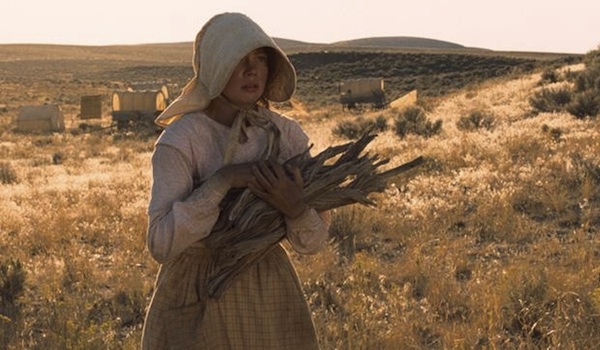Meek’s Cutoff Review
I’m not one to complain about a movie being slow. After all, I’m a big supporter of movies like The American and Drive. Hell, my favorite movie of all-time—2001: A Space Odyssey—is really slow. But when a movie goes nowhere and takes a really long time to do so, I’m more inclined to feel sleepy than engaged. Case in point: Meek’s Cutoff. As a big fan of westerns and director Kelly Reichardt, I really wanted to like this film, but the longer it went on, the more I questioned what the point of this story is. There’s no real beginning or end, which makes it very difficult to become invested in these characters and their dire situation. Yes, there are some nice, very realistic moments, but not nearly enough to give this film a reason to exist.
It’s the mid-1800s, and three couples are journeying across the dangerous terrain of the Oregon Trail. Their guide, Stephen Meek (Bruce Greenwood), claims to know where he’s going, but five weeks into what was supposed to be a two-week-long shortcut, the group is starting to distrust Meek. They’re also hungry, incredibly thirsty, and very anxious about a Native American that’s following them. One day, however, the men in the group, led by Soloman (Will Patton), capture this Native American and decide to use him as a guide alongside Meek. And each couple reacts differently to the new member of their party. It’s Thomas (Paul Dano) and Millie (Zoe Kazan) who are most frightened by him. They wish to hang him and be done with it. William (Neal Huff) and Glory (Shirley Henderson) lean on God for answers. While Soloman and Emily (Michelle Williams) stand up for him and his right to live, even though they aren’t sure of his intentions.
The tension that builds in Meek’s Cutoff is a byproduct of the film’s environment. Every decision these individuals make, as insignificant as it seems, might lead to salvation or death. In that respect, I admired the film. I thought the way it dispassionately presented the struggle of these individuals was unique and as unglamorous as the covered wagons they traveled in.
All that said, it’s difficult to get too wrapped up in a film when its most interesting quality is the realistic way it presents hardship, and even that is more interesting in an analytical way than an emotional one. I frankly didn’t care whether these people lived or died because I knew next to nothing about them. That’s the problem with conveying just a slice of their journey. Had we understood more about them, their motivations, and the way they interacted with one another, I think Meek’s Cutoff would have been more successful.
If you’ve seen Reichardt’s last film, Wendy and Lucy, you know the kinds of performances you’re going to get here. The only one exempt from The Kelly Reichardt School of Understated Acting is Bruce Greenwood, who’s more or less doing his best Rooster Cogburn impression. It’s certainly not a bad performance, just one that feel familiar and is missing the the charm and wit we got out of True Grit‘s grizzled mountain man. Michelle Williams barely registered for me, again not because she’s bad, but because the character is so low-key. There’s a line that needs to be walked carefully in films like this, and unfortunately, a lot of usually very good actors (Paul Dano, Zoe Kazan, Williams) step off that line onto the wrong side, the boring side.
I’m sure there’s a small pocket of individuals out there who enjoy this sort of thing, but I guess I’m not one of them. The entire enterprise felt tedious, and I’m sure watching it at night didn’t help. I don’t want to dismiss the film entirely; It does represent a noble experiment in ultra-realism. But it’s just not remotely enjoyable, and there are a great number of other films that pull of the same experiment in a more entertaining way.
















